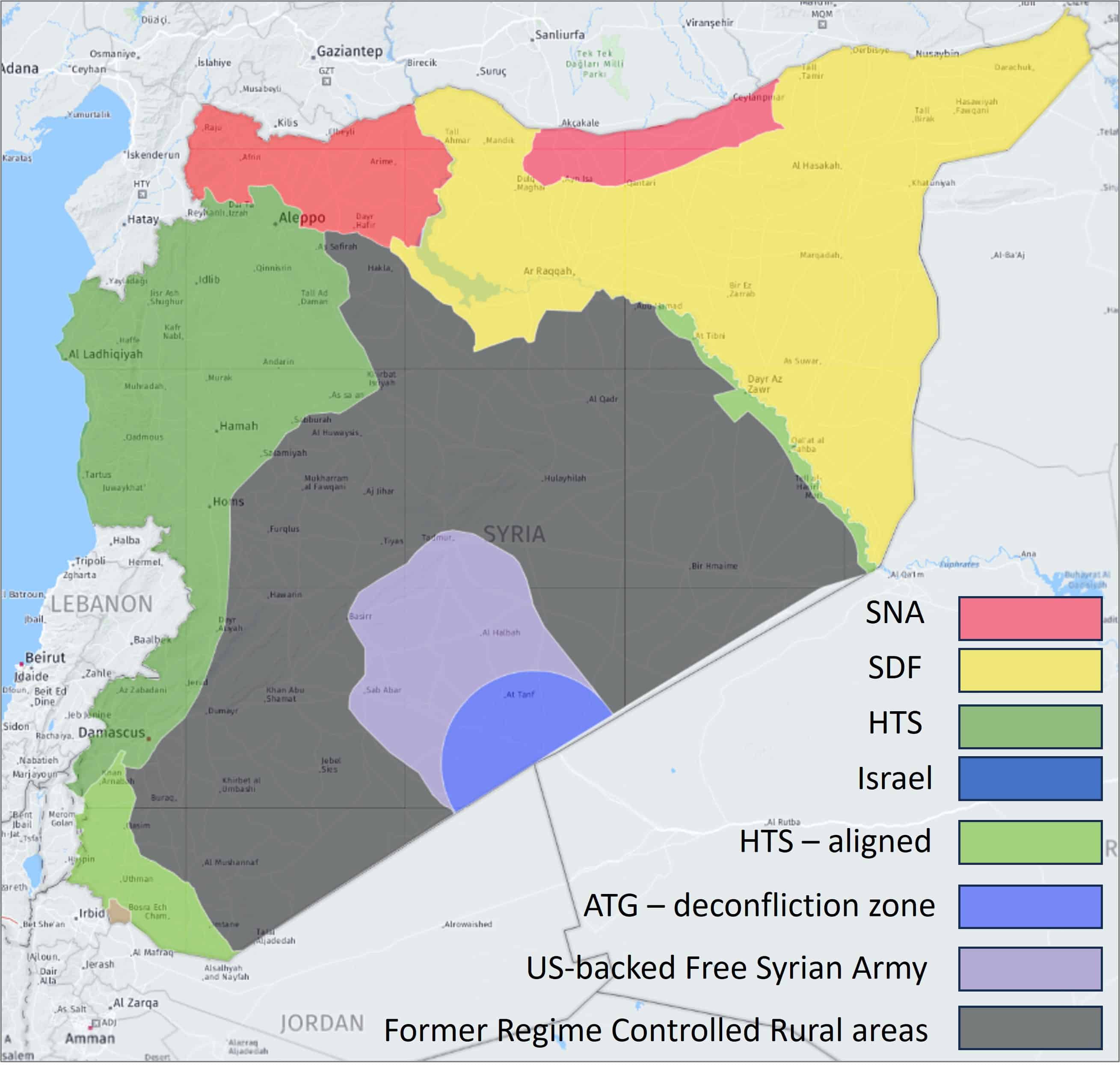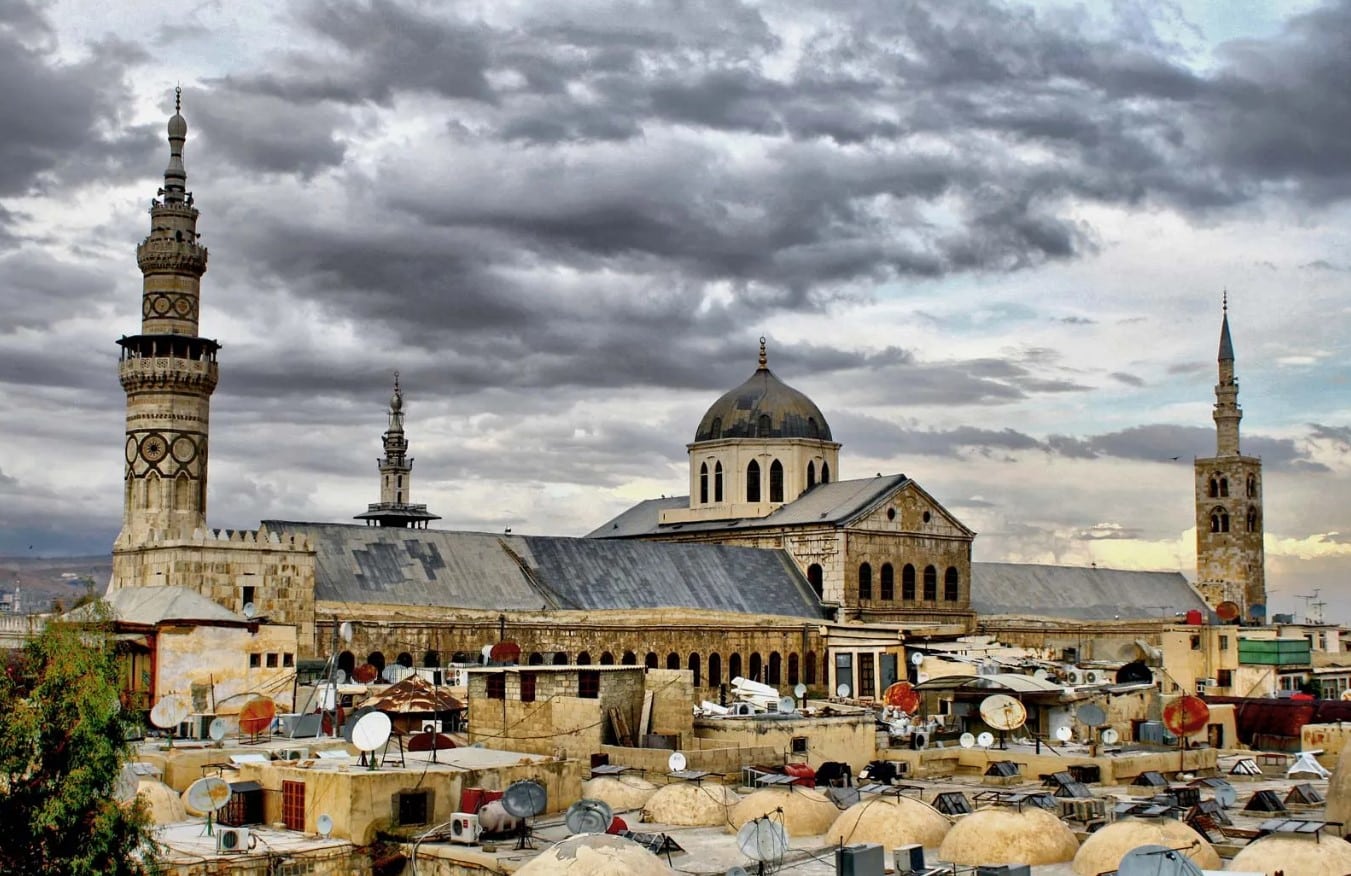Weekly Incident Map
The service will be provided for our existing subscribers for free for a limited time period and then offered as a separate, stand-alone product outside your regular subscription. For inquiries regarding prices for a subscription, or the availability of bespoke reporting on Syria – including in-depth reports, risk assessments and incident data – please email [email protected]. Please also contact us if you are interested in transportation or other security services in Syria. In the meantime, please enjoy this complimentary service.
Executive Summary
-
EU suspends several sanctions on Syria
-
National Dialogue Conference starts in Damascus
-
President al-Sharaa invited to Arab League summit
-
Foreign Minister’s visit to Baghdad postponed
-
Comments by Israeli Prime Minister spark reactions and protests
EU suspends several sanctions on Syria
In a significant development this week, the EU announced the suspension of several select sanctions on Syria, including restrictions on banking, energy, transportation and reconstruction. The decision followed a meeting within the EU Foreign Policy Council in Brussels on 24 February where it decided to lift several restrictions in a bid to “facilitate engagement with Syria, its people and business” in key areas. The lifting of the restrictions also aims to facilitate financial investments and banking.
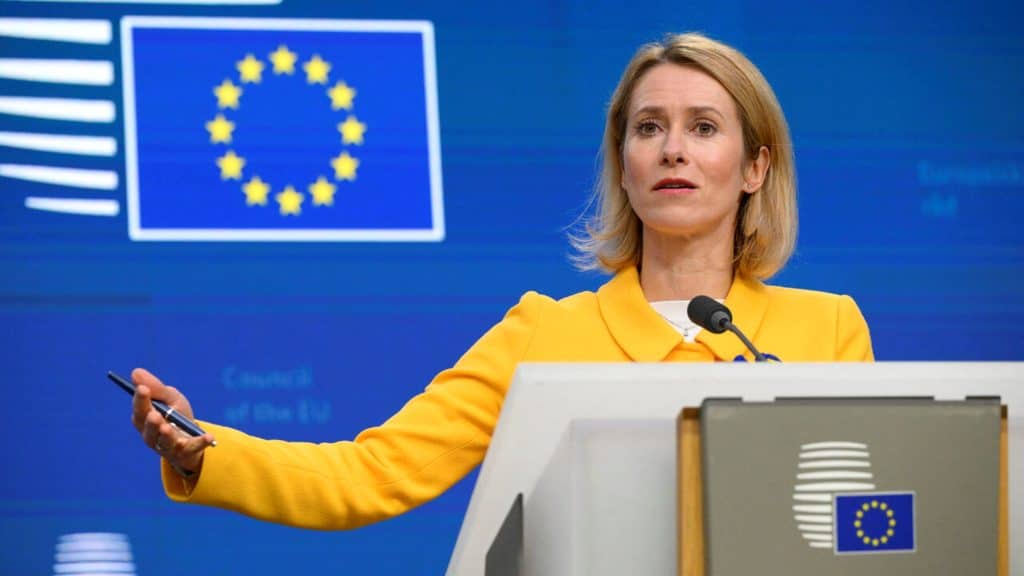
High Representative for Foreign Affairs and Security Policy Kaja Kallas
According to a statement provided on the council website, the Council agreed to:
- Remove five entities (Industrial Bank, Popular Credit Bank, Saving Bank, Agricultural Cooperative Bank, and Syrian Arab Airlines) from the list of those subject to the freezing of funds and economic resources, as well as to allow making funds and economic resources available to the Syrian Central bank
- introduce certain exemptions to the prohibition of establishing banking relations between Syrian banks and financial institutions within the territories of the member states, to allow transactions associated to the energy and transport sectors as well as transactions needed for humanitarian and reconstruction purposes
- extend indefinitely the application of the existing humanitarian exemption
- introduce an exemption for personal use to export prohibitions of luxury goods to Syria.
Moreover, the statement added that the Council will continue its work, assessing whether it is possible to suspend further economic sanctions, and confirmed that it maintains lists related to the Assad regime, the chemical weapons sector, and the illicit drug trade, as well as several measures regarding the arms trade, dual-use goods, and the import and export of Syrian cultural heritage goods.
The announcement on 24 February represents a significant milestone following months of discussions and statements indicating increasing support within the EU member states to lift the restrictions imposed during the Assad-led government. The positive and inclusive rhetoric promoted by the HTS-led government, and its commitment to meeting the timelines set up for the transition (see below) have contributed to increasing support for lifting the measures. This is despite lingering concerns over the HTS’ Islamic extremist roots and skepticism over its actual commitment to an inclusive transition. The decision also comes despite US reluctance and caution, as the HTS remains on the list of groups designated as a Foreign Terrorist Organization (FTO).
Addressing these concerns, EU Foreign Policy High Representative Kaja Kallas warned that the EU will continue to closely monitor the situation and that the bloc is ready to “put the sanctions back” if the government does not follow through on its commitments. Speaking shortly after the announcement, Kallas added “Any kind of government needs to be all-inclusive and taking into account all the different groups that are in Syria.”
National Dialogue Conference starts in Damascus
In a related development, the interim government proceeded this week to organize the much-anticipated National Dialogue Conference which began with an introductory session on 24 February, followed by the start of the main event on 25 February. The conference was inaugurated by President Ahmed al-Sharaa who in his opening remarks called on all components of Syria to unite and pledged to establish a transitional body of justice. The speech also stressed his government’s commitment to resisting any efforts to destabilize the security situation in the country and stressed the need for the government to retain a “monopoly of force” by not allowing armed actors outside of the government.
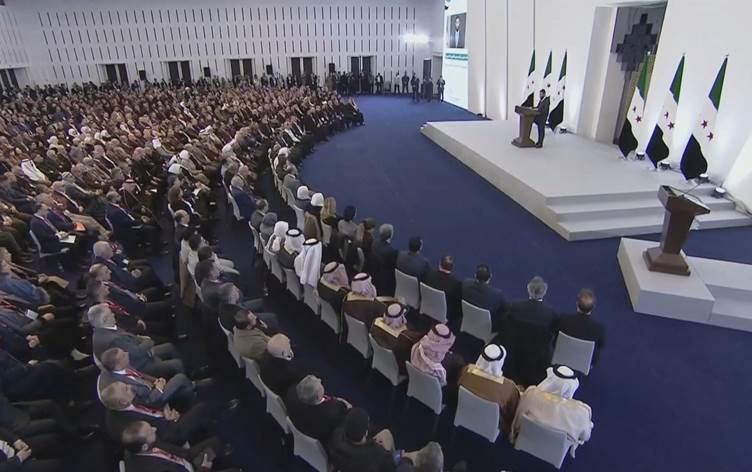
National Dialogue Conference started on 25 February
The conference is attended by 600 participants in total and is scheduled to discuss six separate issues in different sessions. These include constitutional building, transitional justice, institutional reform, personal freedom, “human life issues” as well as the role of civil society organizations and economic issues. None of the recommendations will be binding on the government and the conference has been labeled as a series of “consultations” – however the outcome and any decisions will understandably be closely monitored by the international community and other regional stakeholders as an indication of the future course of the political transition.
The preparations and lead-up to the conference were however subject to controversy and criticism, with critics pointing out a lack of adequate preparation, rushed planning and poor administration as key issues. Several invited participants, including exiled opposition members, reported receiving their invitations very late, with no time to make the meeting. Others criticized a decision to hold only one day of preparations and for a lack of consultations surrounding the agenda. Perhaps most importantly, Kurdish elements criticized the omission of Kurdish components, with the Kurdish National Council and the Syrian Democratic Forces denouncing their exclusion. In response to this, members of the preparatory committee stated that Kurdish representation was guaranteed in the form of individual representation – in line with a previous decision not to allow the participation of groups based on ethnic or religious divides.
As of writing, the outcome of the conference remains to be seen and will be discussed over the coming days, but the event is highly symbolic as part of a broader political transition. While criticism of the “rushed” nature of the conference and the exclusion of Kurdish components are set to resonate in the West, the decision to move forward this week is consistent with the interim government’s earlier pledge to hold the conference before 1 March when a new government is set to be announced. In light of international efforts to lift sanctions, the HTS-led government therefore likely prioritized holding the conference as a show of commitment to the timeline for the transition and thus boasts its legitimacy. Regardless, the full implications of the conference, including perceptions of the HTS-led government, remain to be seen in the coming days and will be discussed once the outcome of the conference is revealed.
President al-Sharaa invited to Arab League summit
In another significant political development this week, Interim President al-Sharaa was invited to attend an emergency session held in Egypt on 4 March. The summit will focus on coordinating Arab efforts to counter US President Donald Trump’s recent, controversial proposal to relocate Palestinian residents away from the Gaza Strip, and to develop the area to a beach resort – a proposal that has been met with dismay and strong reactions in the region. Al-Sharaa’s invitation was made by Egyptian President Abdel Fattah al-Sisi who also congratulated on assuming the presidency position.
The invitation represents a very significant step in building ties between Egypt and the new Syrian government, following months of caution from Cairo where the toppling of Assad by an Islamist group prompted a great deal of unease. Like the UAE and Bahrain, Egypt’s foreign policy under President Sisi has been strongly focused on opposing Islamist movements in the region, especially those linked with the Muslim Brotherhood, and there is a concern that the HTS’ success in Syria will encourage other groups in the region to attempt regime change. The invitation therefore represents an important signal in Egypt’s gradual reorientation and the visit is expected to be the first face-to-face meeting between the two presidents.
Foreign Minister’s visit to Baghdad postponed
In another landmark development this week, Syrian state-linked media confirmed that Foreign Minister Assad al-Shaibani received an invitation to visit Baghdad. The invitation was first rumored last week but then officially confirmed by officials on both sides, with initial reports stating the visit was planned to take place on 22 February. On 23 February however, the Iraqi Foreign Ministry confirmed that the visit had been postponed due to the need to complete “logistical” and “security” preparations. Meanwhile, Syrian government officials said the foreign minister is expected to meet with Prime Minister Muhammed Shia al-Sudani, Foreign Minister Fuad Hussein and senior security officials during the week, with few additional details provided.
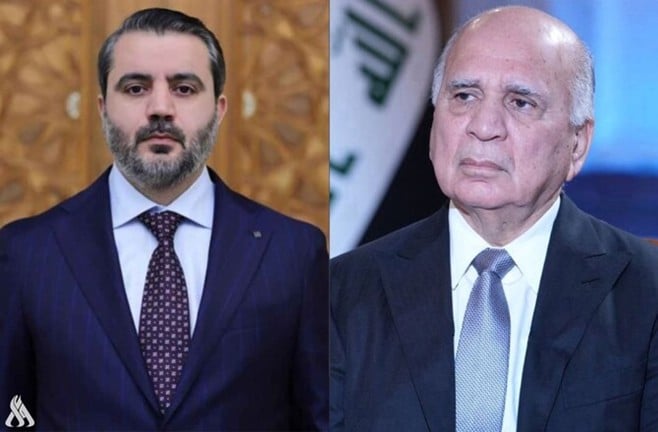
Foreign Minister Assad al-Shaibani and Iraqi Foreign Minister Fuad Hussein
The visit would represent the first high-level diplomatic engagement between the Government of Iraq and the new Syrian government, following months of limited interaction and caution from Baghdad. This is undeniably due to a general sense of unease in Baghdad over the HTS’s takeover in Damascus due to its historical links with al-Qaeda in Iraq (AQI) and other Islamic extremist groups. Moreover, plans to host officials from the new government have been met with resistance from within the Shia-dominated Coordination Framework in Baghdad, with multiple reports of internal resistance and divisions emerging as a result of the GoI’s engagement.
Multiple sources over the weekend reported that the visit has been delayed primarily due to this opposition however in a statement on 23 February the Iraqi Foreign Ministry announced that the delay was due to logistical considerations and appeared to implicitly deny reports of political pushback. Regardless, the issue is expected to remain controversial and a source of tension within Baghdad, and the reactions from pro-Iranian groups to al-Shaibani’s visit will serve as an important indicator that is likely to shape the future relationship between Iraq and the new government in Damascus.
Comments by Israeli Prime Minister spark reactions and protests
The presence of Israeli forces and the continuation of Israeli airstrikes in Syria remain a source of tension, that flared up this week in light of controversial comments made by Prime Minister Benjamin Netanyahu. Speaking at a military graduation ceremony on 23 February, the prime minister said Israel “will not allow the HTS or the new Syrian Army to enter the area south of Damascus” and demands a “complete demilitarization” of the southern provinces of Daraa, Quneitra and As Suwayda. Netanyahu further stated that Tel Aviv will likewise “not allow any threats” to the Druze community in southern Syria.”
In a separate statement on the same day, Israeli Defense Minister Israel Katz said Israeli forces would remain on the peak of Mt Hermon and reiterated the intent to maintain a buffer zone in the area for an “indefinite period” of time. Katz also confirmed that Israeli forces had established two posts on the mountain and seven additional posts within the buffer zone – a reference to a zone set up under a UN-mediated ceasefire agreement in 1974 that Israeli forces proceeded to reoccupy in the wake of the fall of the Assad-led regime.
The comments sparked significant reactions within Syria, with protests reported on 23 and 24 February across the country. The majority were reported in Damascus and the southern provinces of Daraa, Quneitra and Suwayda, but separate gatherings were also recorded in Aleppo, Homs and other provinces. All unfolded peacefully yet localized transit disruptions were noted as a result. Meanwhile, the Israeli military continued to conduct airstrikes against alleged Hezbollah smuggling routes in western Homs province. On 21 February, the Israeli military announced that it targeted several sites along the border used by Hezbollah to “smuggle weapons into Lebanese territory” and that these activities constitute a “blatant violation of the ceasefire understandings between Lebanon and Israel.” Separate sources stated that the airstrikes targeted illegal crossing points in the vicinity of Walid Khaled, in western Homs province. Several individuals were injured as a result while “heavy damages to vehicles and buildings” were reported. Lebanese state-linked sources also confirmed the entry of “enemy aircraft” flying at low altitude in the early hours of 21 February over the city of Hermel and Beeka Valley near the border areas.
While linked to separate issues, the continuation of Israeli ground and airstrike operations form a standing risk indicator that may escalate on a regional level as well as prompting localized reactions. The border incursion in western Daraa and Quneitra serves two primary objectives. First, the presence on Mt Hermon serves to enhance Israeli detection and interception capabilities when it comes to monitoring incoming aerial threats emanating from Syrian territory. Secondly, Israel acts to establish ties and protect members of the Druze community.
Meanwhile, the targeting of Hezbollah smuggling routes serves to neutralize efforts by Iran-backed factions to maintain a route of transportation into Lebanon, with associated operations expected to continue. The associated risk of a breakdown in the Israeli-Hezbollah ceasefire remains a consideration as both sides accuse each other of violating the terms of the deal and threaten to restart hostilities unless the other side respects stated commitments. So far, the implications on border security have been limited to western Homs and illegal sites, but the related developments remain important to monitor in the event of an escalation.
Control of Terrain Map – February 2025
